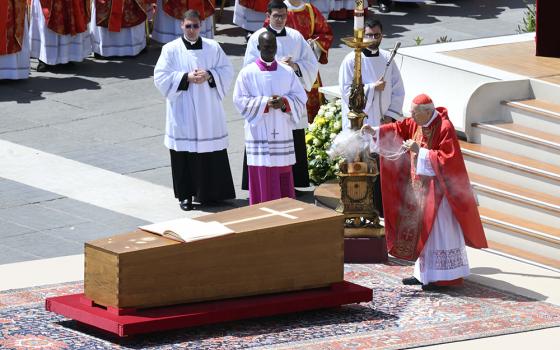Phil Lawler, who writes at CatholicCulture.org, posted a column yesterday chastising Boston’s Cardinal Sean O’Malley for a sermon he gave last Sunday in the wake of the Boston Marathon bombings. You can read the text of, or watch, the homily over at Whispers by clicking here.
Lawler is upset for a variety of reasons, but essentially he thinks the cardinal committed a couple of sins of commission and one of omission. The sins of commission include the fact that Cardinal O’Malley set the bombing into the context of a culture of death and mentioned several other examples of how that culture de-humanizes us. He mentioned abortion, the death penalty, individualism, alienation, violent films and video games, and, lastly, “The inability of the Congress to enact laws that control access to automatic weapons is emblematic of the pathology of our violent culture.”
Lawler thinks this last was both inappropriate, because it was a political statement, and inaccurate, because it was a limit on the sale of “semi-automatic weapons,” not “automatic weapons,” that was defeated last week in the U.S. Senate. And, finally, Lawler thinks that the cardinal’s comment on the failure to enact gun control legislation was misleading because “tighter gun control laws would not have prevented the Marathon bombing.”
It is somewhat astounding that a person who writes for a website that has the word “culture” in its name would find it objectionable for Cardinal O’Malley to take the discrete event, the bombing, and set it in a wider cultural context. It may be true that a ban on the sale of semi-automatic assault weapons might not have prevented the bombing, just as it is true that a more rigorous regime of background checks would not have kept weapons out of the hands of the shooter at Sandy Hook Elementary School because the young man there used his mother’s guns. But, does Lawler really not grasp that in assessing a “culture of death” or any culture for that matter, it is difficult to leave politics out of the assessment? Does Lawler really think that there is no link whatsoever between the violent behavior of individuals and our culture’s exaltation of violence from those horrific neo-gladiatorial displays on television when two men are put into a caged ring and try to pummel the other into submission, to a candidate discussing “Second Amendment remedies” (by which she did not mean remedying the Second Amendment), to the devaluing of our sense of the sacredness of all human life that is this nation’s abortion rate?
There is one sense in which Lawler is on to something, but interestingly he does not mention it. In Japan, they have violent videogames and movies. In Japan, they have mixed martial arts events that recreate gladiator fights. There are over a quarter of a million abortions in Japan per year. What they don’t have in Japan is a bunch of firearms and, consequently, they have very, very few instances of gun violence.
The point, the obvious point, that Cardinal O’Malley was making is that in the face of any particular high profile instance of violence, whether we could have prevented that instance or not, we do well to examine our conscience and our culture to see how we contribute to the idea that violence is acceptable. That cardinal was not making the point that abortion is like a bombing in every instance, but that both are instances of violence against particular individuals and that, collectively, such instances amount to a “culture of death.” Finally, the Cardinal was making the equally obvious point that, as Catholic Christians, we are called to create a culture of life, indeed the Church herself, if she is to be true to her founder, must itself be a culture of life in which communicants live out their dignity, they do not mutilate that dignity, by setting up false idols like the Second Amendment, or by keeping the gun control log in our own eye while ignoring the pro-choice log in our other eye. The cardinal was, in short, saying that a Catholic must be pro-life first and foremost, on all issues and in every instance.
When I read Cardinal O’Malley’s homily, I was reminded of Cardinal Bernardin’s famous speech about the seamless garment. In 1984, in a speech in St. Louis, Bernardin said:
The reason I have placed such stress on the idea of a consistent ethic of life from the beginning of my term as chairman of the Pro-Life Committee of the National Conference of Catholic Bishops is twofold: I am persuaded by the interrelatedness of these diverse problems, and I am convinced that the Catholic moral vision has the scope, the strength and the subtlety to address this wide range of issues in an effective fashion. It is precisely the potential of our moral vision that is often not recognized even within the community of the Church. The case for a consistent ethic of life—one which stands for the protection of the right to life and the promotion of the rights which enhance life from womb to tomb—manifests the positive potential of the Catholic moral and social tradition.
It is interesting to note that today, Cardinal O’Malley is the chair of the Pro-Life Committee at the bishops’ conference. Perhaps it is a charism of the office that permits its holder to see how these various threats to a culture of life are inter-related. Nah. Anyone can see it unless, like Lawler, you think the Second Amendment is sacrosanct and has nothing to do with a culture of life.
The most troubling part of Lawler’s column, however, comes at the end. He writes:
Cardinal O’Malley may have been right to say that the bombers were influenced by a “perversion of their religion.” He was certainly right to warn against a blanket condemnation of all Muslims. But he missed an opportunity to comment on a problem that was surely on the minds of those who heard or read his homily. The cardinal’s congregation was not (for better or worse) thinking about abortion or gun-control or video games. The people of Boston were thinking about Islamic terrorism. It’s a difficult topic, but one that Church leaders cannot wish away.
Call me foolish, but I think if Cardinal O’Malley had taken Lawler’s advice, we would see headlines about “Holy War” or “Cardinal Calls For New Crusade.” It is not the job of the Cardinal-Archbishop of Boston to inflame tensions, it is his job to inflame the hearts of his flock. The people in the pews may have been thinking about “Islamic terrorism” but there is not much they can do about it. There is something they can do about American culture, namely, make it more human by making it a culture of love and, I might add, a culture that is more welcoming of immigrants, including Muslim immigrants.
I admit that some liberals tie themselves in knots in their unwillingness to utter the words “extremist” or “terror” in the same sentence as the word “Islam.” I hope Lawler will admit that, first, Cardinal O’Malley is not someone you would normally call a “liberal” and, second, that it is a bishop’s job to sow love and forgiveness and reconciliation in all circumstances, not to confuse the pulpit of the Cathedral of the Holy Cross with the “bully pulpit” of a politician, still less, the ideological pulpit of cable news analysis. A pundit who fails to acknowledge that extremists, possessed of a radicalized and perverted understanding of Islam, are the most obvious terror threat today is a fool. A preacher who fails to acknowledge that is not deficient in his reasoning; He is someone whose reasoning is so shaped by the example of the Master, that his heart, and so his words, have no room for division, even if it were justified, and whose truth is not a geo-political truth, but the Gospel truth.





